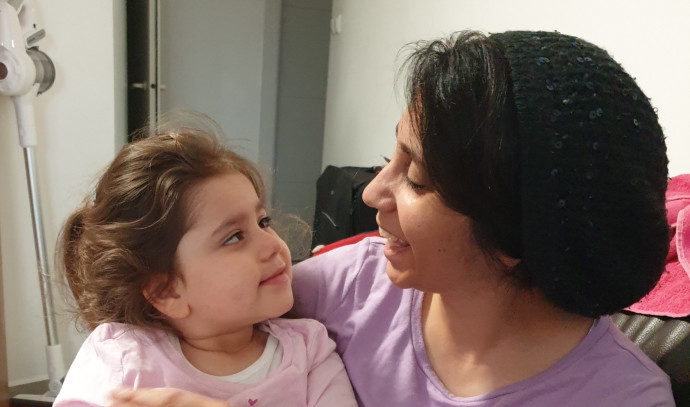|
Getting your Trinity Audio player ready...
|
October is Rett Syndrome Awareness Month. During this month, as with all other months, the Israel Rett Syndrome Association (IRSA), makes special efforts to highlight the genetic condition.
“Rett syndrome is a severe rare genetic neurological disorder that occurs almost exclusively in girls, more rarely in boys, and leads to severe impairments, affecting nearly every aspect of the child’s life: their ability to speak, walk, eat, and even breathe easily,” Sigal Hertz-Tirosh, IRSA CEO explained.
Those with Rett Syndrome are also known as “Silent Angels” due to their inability to speak.
The condition causes a variety of physical and developmental impairments, but, in many cases, those with Rett Syndrome still have perfectly functioning minds able to comprehend the events and people around them.
Speaking to Rosalind Goldenberg, the mother of Noa, a four-year-old girl with the condition, Goldenberg relates some of the challenges posed by Rett Syndrome.
“In her situation, it’s quite hands-on, because she doesn’t have any motor skills,” Goldenberg explained. “She’s never been able to sit up by herself or to stand or to even crawl.” For every aspect of her life, Noa needs her parents’ help. For a little girl who, despite her physical limitations, is still able to fully process the world around her, this can be particularly frustrating.
“She has a lot of crying fits,” Rosalind went on to say about her daughter. “They can last for an hour or even longer, where she’s so frustrated that she’s so unable to tell us something she’ll just cry and cry and cry and throw herself around. It’s very difficult as a parent because you feel like you can’t do anything. Eventually, just out of tiredness, she’ll stop or she’ll fall asleep.”
What causes Rett Syndrome?
Hertz-Tirosh explains that disease is the result of mutations on the MECP2 gene in the X chromosome. Further, while females have two X chromosomes, males only have one. As a result, the majority of boys with Rett Syndrome either die before or shortly after birth. Consequently, the vast majority of those with the condition are girls.
While Rett Syndrome is genetic, it is not hereditary. Children diagnosed with the condition are not inheriting it from their parents.
Fortunately, the IRSA has been there to support Noa and her family as they support all the other Rett Syndrome families in Israel.
“When we first got the diagnosis, I was given Sigal’s phone number and she gave me access to the Whatsapp group with all the parents [of kids with Rett’s Syndrome] and the country,” Goldenberg said. The group and the organization helped her family learn about the best care practices for a child with Rett Syndrome, what equipment they would need, what the latest research on the disease found, how to best support Rett Syndrome awareness and research, and so much more.
Beyond supporting Rett Syndrome families, however, IRSA works to support efforts to find a cure.
“Since its establishment, the Israeli Rett Syndrome Association has been funding research to find a CURE to Rett Syndrome,” Hertz-Tirosh noted. “Over the years we have invested more than 20,000,000 NIS in funding researchers.” One of the companies the IRSA is in contact with is Canada’s Taysha Gene Therapies.
Taysha Gene Therapies, this year, for the first time in history, dosed a human Rett Syndrome patient with a new gene therapy treatment. While there is a long way to go, initial results are very promising and show high degrees of efficacy.
In Israel, while there are only 195 girls and two boys diagnosed with Rett Syndrome, they and their families are anxiously waiting for those treatments that exist, and are in development, abroad, to come to Israel.
What should happen next?
Part of what needs to happen though, as the IRSA sees it, is for further funding and increased awareness of Rett Syndrome.
“It is important to me that the medical community becomes more familiar with the syndrome,” Hertz-Tirosh writes. She explains that Rett Syndrome patients get the best possible care ahead of that “long-awaited moment when there will be a CURE for Rett syndrome.”
Finally, Goldenberg offers a piece of advice for new parents of children, like Noa, who have been diagnosed with Rett’s Syndrome.
“I would say, first of all, to connect with other parents and get support. Emotional support is extremely important. And these are parents who are doing very similar things to them. They’ve been through it, and they know the ropes so they can give guidance, give support, and that makes a huge difference because they [help one] feel less alone.”
You can visit the Israel Rett Syndrome Association website to learn more.



